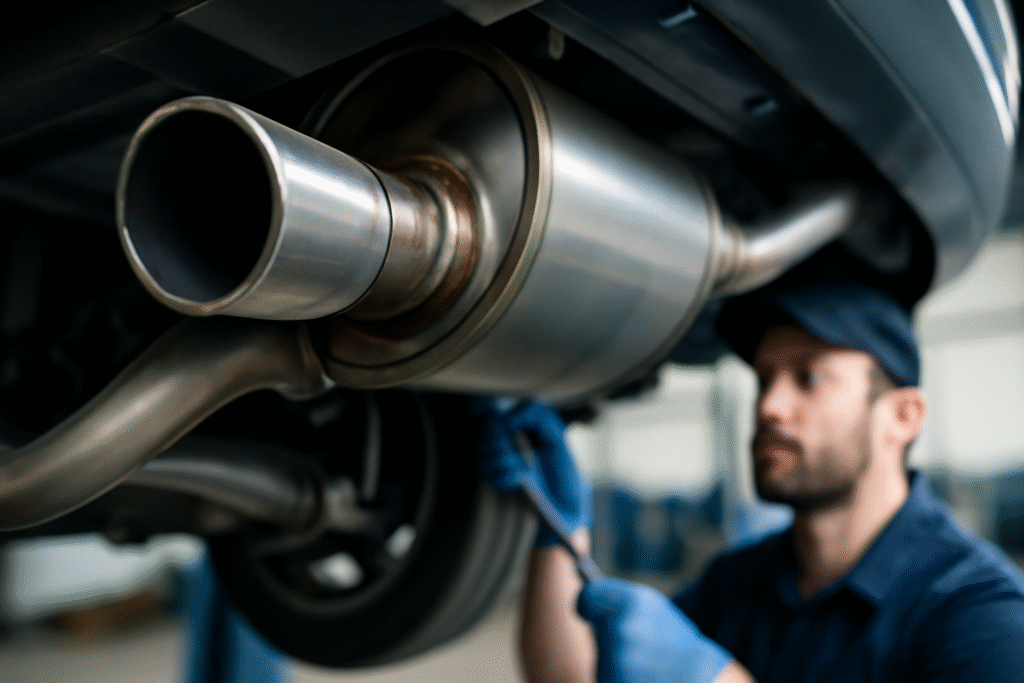
Essential Tips for Maintaining Your Car Exhaust System for Optimal Performance and Longevity
Did you know that a well-maintained car exhaust system can save you money in the long run by improving fuel efficiency and preventing costly repairs? 
In this article, we’ll share essential tips for maintaining your car exhaust system, ensuring optimal performance and longevity. Whether you’re a seasoned car owner or a first-time driver, these easy-to-follow tips will help you keep your exhaust system running smoothly and efficiently, all while saving you from expensive repairs. Ready to boost your car’s lifespan and performance? Keep reading to learn how simple maintenance steps can make a world of difference!
Table of Contents
ToggleUnderstanding the Car Exhaust System
The car exhaust system plays a crucial role in your vehicle’s overall performance and environmental impact. 
What Is the Exhaust System?
In simple terms, the exhaust system channels harmful gases away from the engine and out of your car. It consists of several key components, including:
- Exhaust manifold: This component collects exhaust gases from the engine’s cylinders and directs them into the exhaust system.
- Catalytic converter: It reduces harmful emissions like carbon monoxide and nitrogen oxides into less harmful substances such as carbon dioxide and water vapor.
- Muffler: The muffler reduces the noise produced by the engine’s exhaust gases, ensuring a quieter ride.
- Exhaust pipes: These carry exhaust gases from the engine, through the catalytic converter, and finally out of the vehicle.
How Does the Exhaust System Work?
When you start your engine, it burns fuel, creating exhaust gases. These gases are routed through the exhaust manifold, where they enter the catalytic converter. The converter does its job by turning harmful pollutants into harmless substances. From there, the gases travel through the muffler and exhaust pipes, exiting the vehicle through the tailpipe.
Why Is It Important?
A properly functioning exhaust system is essential for your vehicle’s health. It ensures:
- Reduced emissions: Minimizes the car’s environmental impact by reducing harmful pollutants.
- Better fuel efficiency: A clean exhaust system helps your engine run more efficiently, saving you fuel.
- Noise control: Keeps your car quieter and more pleasant to drive.
Understanding your exhaust system and its components is the first step in keeping it in top shape. A well-maintained exhaust system improves your car’s performance, enhances fuel efficiency, and contributes to a cleaner environment 
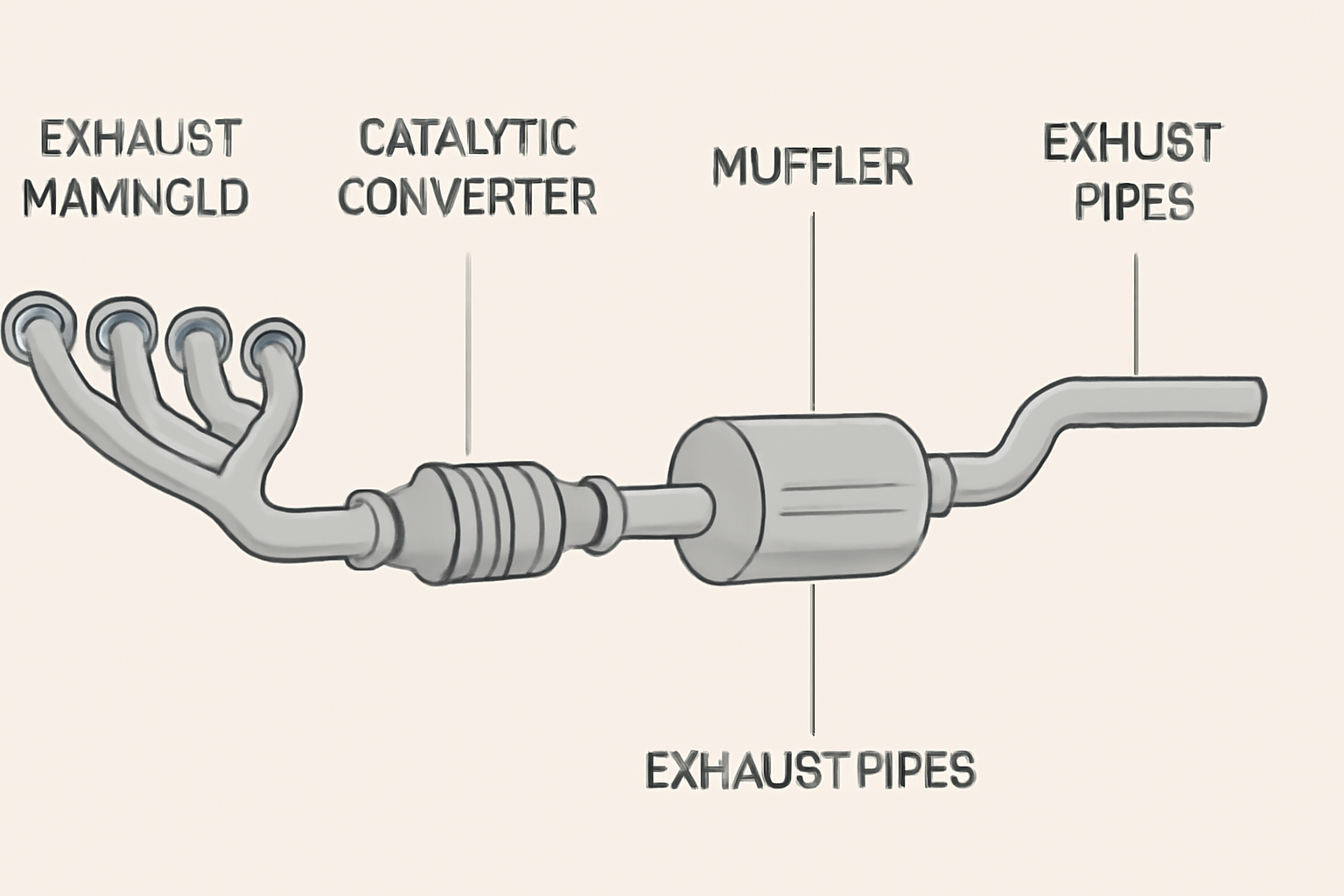
Common Problems with the Car Exhaust System
Your car’s exhaust system is built to last, but like any part of the vehicle, it can run into issues over time. Recognizing these problems early can save you money on repairs and keep your car running efficiently. Here are the most common problems you may encounter with your exhaust system and how to spot them.
1. Excessive Noise 
One of the most noticeable signs that something is wrong with your exhaust system is increased noise. If you hear loud, rumbling, or rattling sounds coming from your vehicle, it could indicate an issue with the muffler or other components.
- Cause: A damaged muffler or exhaust pipe is often the culprit.
- Solution: If your car is making unusual noises, it’s time to have it inspected. A mechanic will check for leaks, holes, or loose parts and fix them to restore the quiet operation of your exhaust system.
2. Check Engine Light 
A glowing “Check Engine” light can indicate many issues, including problems with the exhaust system. More specifically, it could point to an issue with the oxygen sensors or catalytic converter, both of which are vital for reducing emissions.
- Cause: Faulty oxygen sensors or a clogged catalytic converter.
- Solution: If the check engine light comes on, get your car diagnosed. Modern vehicles have onboard diagnostics (OBD-II) that can pinpoint the exact issue.
3. Reduced Fuel Efficiency 
If you notice your car is using more fuel than usual, your exhaust system could be contributing to the problem. A clogged or malfunctioning catalytic converter or exhaust pipe can affect your engine’s efficiency.
- Cause: A blockage in the exhaust system, preventing gases from escaping properly.
- Solution: Have your exhaust system checked to ensure that the gases are flowing freely. Regular maintenance can prevent blockages and keep your fuel efficiency in check.
4. Strong, Rotten Egg Smell 
A strong, sulfur-like smell, often compared to rotten eggs, is a sign of a failing catalytic converter. The catalytic converter helps convert harmful gases into less harmful ones, and when it malfunctions, it can emit this unpleasant odor.
- Cause: A malfunctioning or clogged catalytic converter.
- Solution: If you notice this smell, it’s best to replace the catalytic converter before it affects your engine’s performance.
5. Visible Damage or Rust 
Rust or visible damage on the exhaust system parts, such as the pipes or muffler, is a common problem, especially if you live in areas with salty roads in the winter. Rust can cause leaks, which affect your car’s performance and increase emissions.
- Cause: Exposure to moisture, road salts, and high temperatures.
- Solution: Regularly inspect your exhaust system for signs of rust or cracks. If you find damage, it’s crucial to repair or replace the affected parts to prevent further problems.
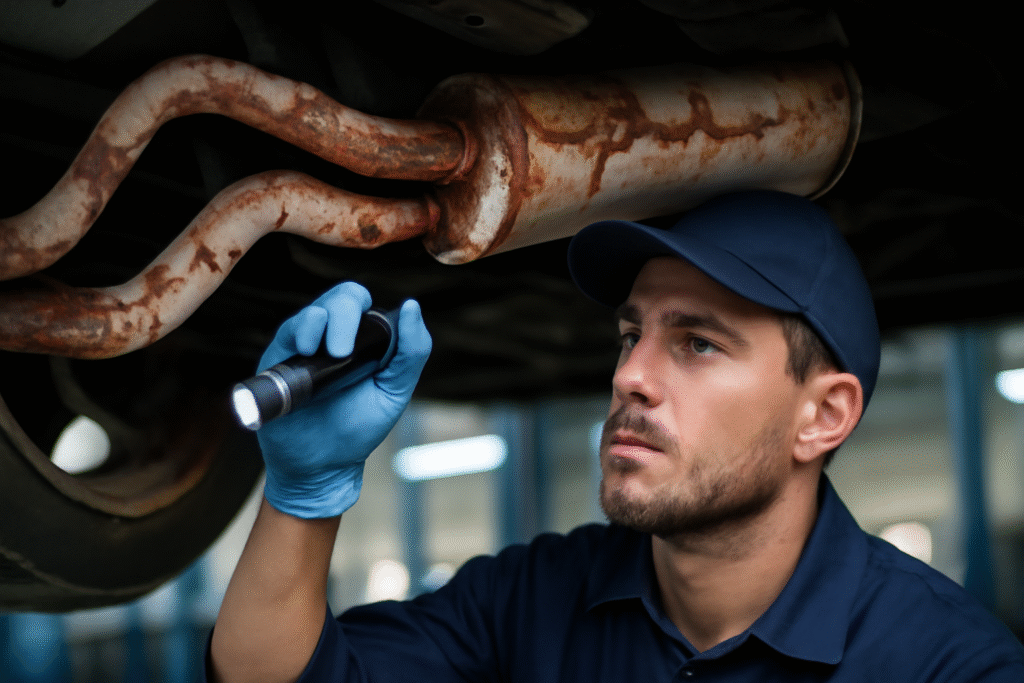
Essential Tips for Maintaining Your Car Exhaust System
Maintaining your car’s exhaust system doesn’t have to be complicated. By following a few simple tips, you can ensure optimal performance, reduce emissions, and avoid costly repairs. Here are some essential tips to keep your exhaust system in top shape.
1. Perform Regular Inspections 
Regularly inspecting your exhaust system is the first step in keeping it functioning well. Check for any visible damage, such as cracks, rust, or loose parts. Pay special attention to the exhaust pipes and muffler, as these are most prone to wear.
- Actionable Tip: Take a flashlight and look under your car to spot any visible issues. Don’t forget to check for holes or rust that could lead to leaks.
2. Check for Leaks 
Exhaust leaks can reduce engine performance and fuel efficiency. Even small leaks can lead to dangerous exhaust fumes entering the cabin, so it’s crucial to address them immediately.
- Actionable Tip: Start your car, listen for unusual sounds (like hissing), and feel around exhaust joints for any escaping air. If you notice a leak, it’s time to replace the affected part.
3. Clean the Exhaust System 
Over time, dirt and debris can build up inside the exhaust system, leading to clogs that affect performance. Regular cleaning helps prevent these issues and ensures proper exhaust flow.
- Actionable Tip: Consider taking your car to a mechanic for an annual exhaust system cleaning. A professional cleaning can remove carbon buildup and restore flow.
4. Repair or Replace Damaged Parts Quickly 
If you find any damaged components, it’s important to address the issue right away. Ignoring small problems can lead to bigger, more expensive issues down the road.
- Actionable Tip: If your muffler is rattling or your catalytic converter is clogged, have them replaced as soon as possible. It’s far cheaper to fix a small problem than to let it damage other parts of your car.
5. Maintain Proper Engine Performance 
Your engine and exhaust system work closely together. If your engine isn’t running efficiently, it can put stress on the exhaust system, leading to premature wear.
- Actionable Tip: Make sure your engine is well-maintained by regularly replacing air filters, using the correct fuel, and having the engine tuned up. A healthy engine equals a healthy exhaust system!
6. Avoid Short Trips 
Frequent short trips prevent your exhaust system from heating up enough to burn off moisture that could lead to corrosion and rust. Long drives are beneficial for your exhaust system.
- Actionable Tip: Once in a while, take your car on a longer drive to allow the exhaust system to reach high temperatures and clear out moisture.
7. Drive Smoothly 
Aggressive driving can strain the exhaust system. Sudden acceleration or rapid deceleration can cause unnecessary stress on components, potentially leading to premature damage.
- Actionable Tip: Try to drive smoothly by accelerating gently and avoiding harsh braking. This will help maintain the health of your exhaust system and improve fuel efficiency.
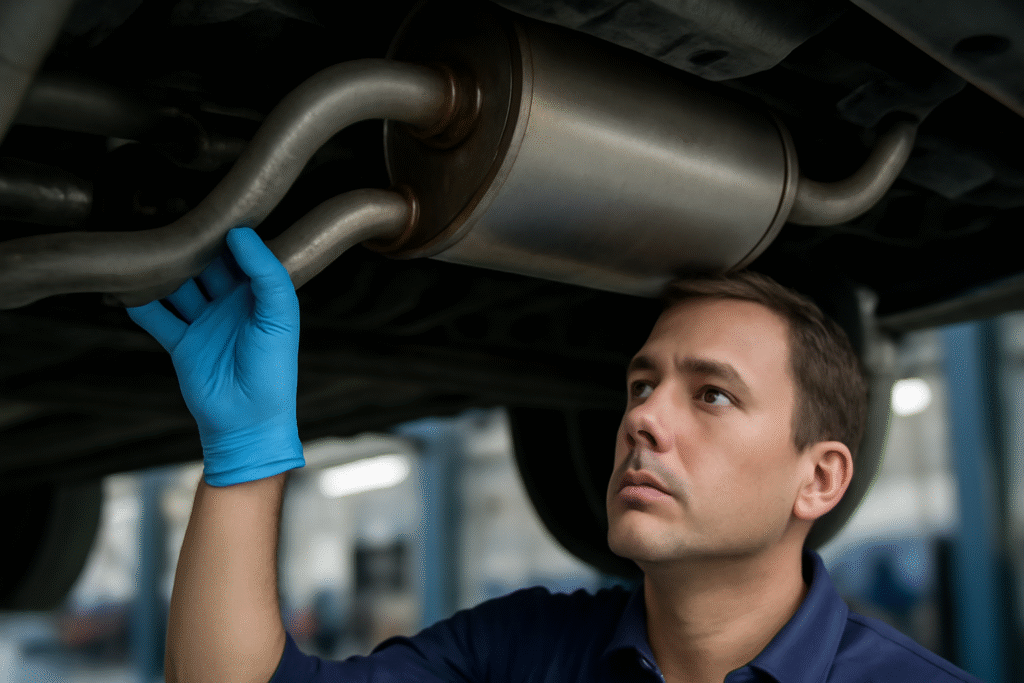
Preventative Measures
Taking proactive steps to prevent exhaust system issues is one of the best ways to save money and ensure your vehicle runs smoothly for years to come. By following these simple preventative measures, you can avoid costly repairs and maintain your car’s performance.
1. Avoid Frequent Short Trips 
Short trips prevent your exhaust system from heating up enough to burn off moisture that could lead to rust and corrosion. When the exhaust system stays cool, condensation builds up, which can lead to long-term damage.
- Actionable Tip: Whenever possible, take your car for longer drives to allow the exhaust system to reach optimal temperatures. This will help prevent moisture buildup and protect the system from rust.
2. Drive Smoothly 
Aggressive driving puts unnecessary stress on your exhaust system. Rapid acceleration and sudden braking create heat and pressure that can damage key components, such as the muffler and exhaust pipes. Smooth, steady driving is better for both your exhaust system and your fuel efficiency.
- Actionable Tip: Accelerate gently, maintain a steady speed, and avoid harsh braking to keep your exhaust system in good shape. Not only will this improve your vehicle’s lifespan, but it’ll also save you on gas!
3. Wash the Undercarriage Regularly 
If you live in an area where roads are salted in winter, salt can accumulate on your car’s undercarriage, speeding up rust and corrosion on the exhaust system. Regularly washing your car’s undercarriage will help prevent salt buildup.
- Actionable Tip: Rinse the underside of your vehicle, especially during the winter months, to wash away road salt and dirt. This simple action can significantly extend the life of your exhaust system.
4. Use High-Quality Fuel 
The quality of the fuel you use affects your exhaust system. Low-quality or contaminated fuel can cause incomplete combustion, leading to excess carbon buildup in the exhaust system and damaging components like the catalytic converter.
- Actionable Tip: Always opt for high-quality fuel from reputable sources. While it may cost a little more upfront, it’ll keep your exhaust system and engine cleaner and more efficient in the long run.
5. Get Regular Engine Tune-ups 
A properly tuned engine puts less strain on the exhaust system. Keeping your engine in good shape ensures that it operates efficiently, which in turn keeps the exhaust system functioning properly.
- Actionable Tip: Schedule regular tune-ups with a trusted mechanic to keep your engine running smoothly. A tuned-up engine will help reduce emissions and improve the performance of your exhaust system.
6. Check Your Tires 
Properly inflated tires help maintain optimal fuel efficiency, reducing the load on the engine and exhaust system. Under-inflated tires can increase rolling resistance, which may cause the engine to work harder and strain the exhaust system.
- Actionable Tip: Regularly check and maintain the correct tire pressure to ensure your car runs efficiently. This simple step can help your exhaust system work less hard and extend its lifespan.
Preventative Maintenance: The Key to Longevity 
By following these preventative measures, you can significantly reduce the likelihood of exhaust system problems and increase the longevity of your vehicle. Routine maintenance and mindful driving habits go a long way in keeping your exhaust system—and your car—running smoothly.
Stay proactive, and your car will thank you with improved performance, better fuel efficiency, and fewer repairs down the road.
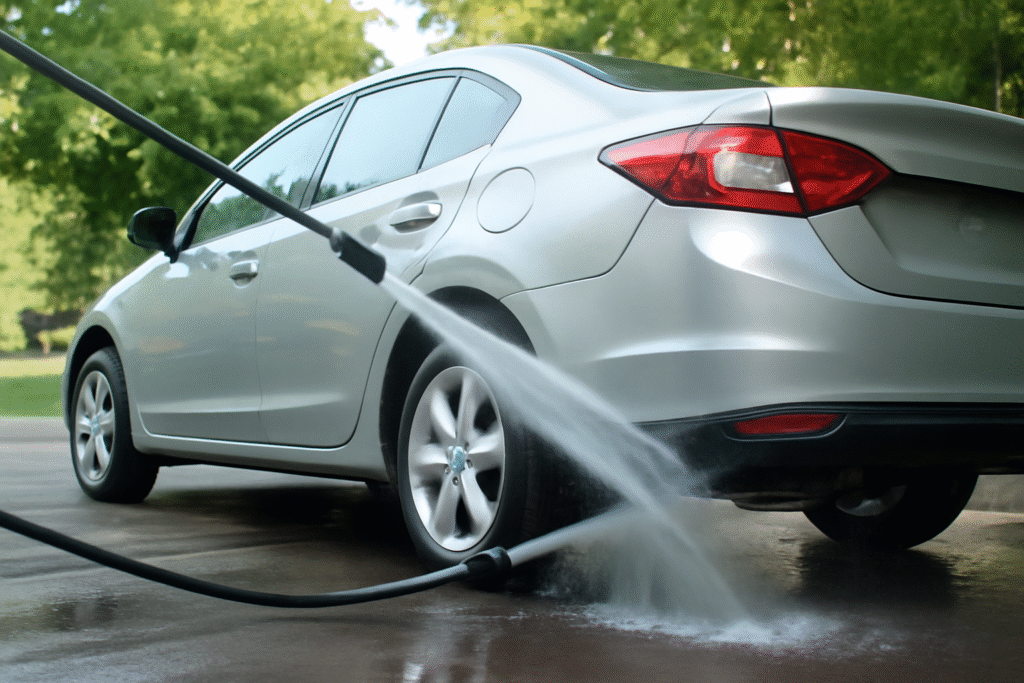
When to Replace Your Car Exhaust System
While regular maintenance can extend the life of your car’s exhaust system, there will come a time when replacement is necessary. Knowing when to replace your exhaust system is crucial to avoid expensive repairs and keep your car running efficiently. Here are the key signs that it’s time for a replacement.
1. Loud, Unusual Noises 
If your car has suddenly started making loud rumbling or clanking noises, it could be a sign that your exhaust system is failing. While some noise is normal, excessive sound indicates problems with parts like the muffler, exhaust pipes, or catalytic converter.
- Actionable Tip: If the noise is significantly louder than usual or sounds like metal rattling, it’s time for an inspection. A mechanic can pinpoint the source and determine if replacement is necessary.
2. Visible Damage or Rust 
Rust and visible cracks on your exhaust system can lead to leaks, which affect both engine performance and emissions. If you notice rust or damage during an inspection, it’s important to address it before it worsens.
- Actionable Tip: If the rust or damage is too extensive to repair, replacing the affected parts or the entire system might be your best option to avoid further issues and keep the system running efficiently.
3. Poor Engine Performance 
A failing exhaust system can cause a variety of engine performance issues, including decreased acceleration and poor fuel efficiency. If you’re experiencing these problems along with a drop in overall power, your exhaust system might be to blame.
- Actionable Tip: If your car feels sluggish or struggles to accelerate, it could be due to a clogged catalytic converter or exhaust pipe. These parts often need to be replaced to restore proper performance.
4. Check Engine Light 
The “Check Engine” light often illuminates when your exhaust system is malfunctioning, especially if there’s an issue with the oxygen sensors or catalytic converter. These problems can significantly impact your car’s emissions, performance, and fuel efficiency.
- Actionable Tip: If your “Check Engine” light is on and diagnostics point to exhaust system components, it’s time to replace the faulty part. Delaying this replacement can lead to increased repair costs down the road.
5. Failed Emissions Test 
If your vehicle fails an emissions test, it’s often due to a problem with the exhaust system, such as a clogged catalytic converter. A failed emissions test means your car isn’t meeting environmental standards, and it’s important to resolve the issue.
- Actionable Tip: If your car fails the emissions test, schedule a replacement of the problematic component, whether it’s the catalytic converter or another part of the exhaust system. This will help your car meet legal requirements and reduce environmental impact.
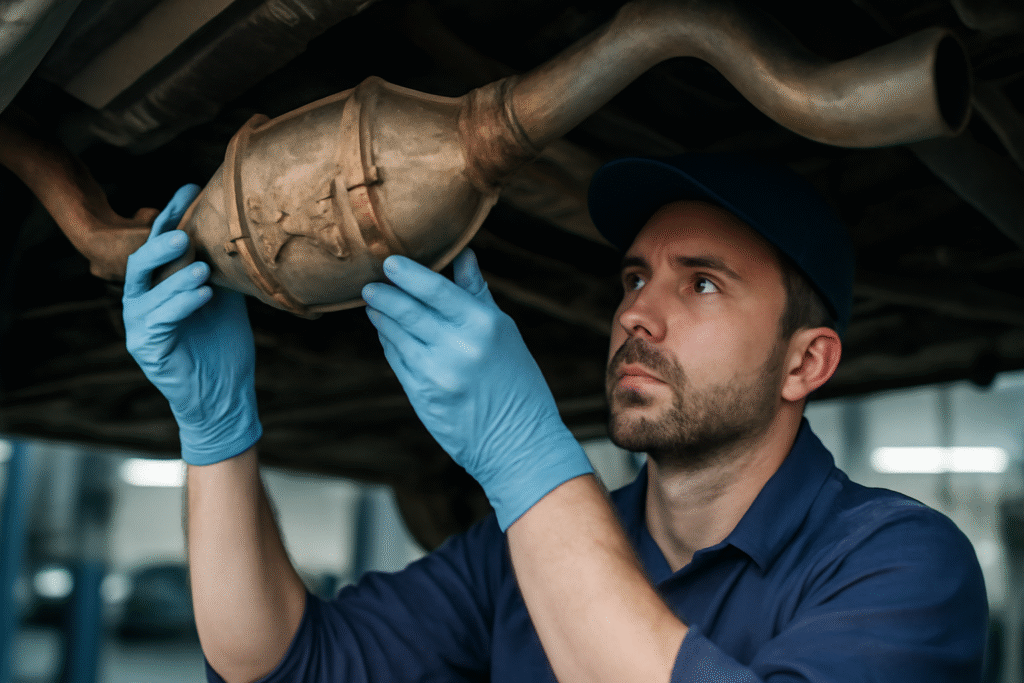
Maintaining your car’s exhaust system is key to ensuring its optimal performance, longevity, and fuel efficiency. By following the essential tips outlined in this article, such as performing regular inspections, cleaning the system, and driving smoothly, you can prevent many common issues and avoid costly repairs.
Remember, a well-maintained exhaust system not only improves your vehicle’s performance but also contributes to a cleaner environment by reducing harmful emissions.
If you notice any signs of trouble, such as unusual noises, poor engine performance, or a failing emissions test, don’t wait too long to address the issue. Timely repairs and replacements will save you money in the long run and keep your car running smoothly for years to come.
Stay proactive with your car’s exhaust system maintenance, and you’ll enjoy better fuel efficiency, smoother rides, and fewer trips to the mechanic. Keep your car healthy, and it will take care of you!

Frequently Asked Questions (FAQ)
1. How often should I inspect my car’s exhaust system?
It’s a good idea to inspect your exhaust system at least once a year. Regularly check for visible damage, rust, or leaks, especially after harsh weather conditions. If you notice unusual sounds or performance issues, have it checked sooner.
2. What are the signs that my exhaust system needs repair?
Signs that your exhaust system needs repair include loud noises, poor fuel efficiency, check engine light, or visible rust and cracks. If you smell exhaust fumes inside the car, it’s crucial to inspect the system immediately.
3. How can I prevent rust in my exhaust system?
To prevent rust, rinse your car’s undercarriage during the winter months to remove salt and debris. Additionally, taking your car for longer drives allows the exhaust system to reach higher temperatures and burn off moisture, preventing corrosion.
4. Can I drive with a damaged muffler?
While you can technically drive with a damaged muffler, it’s not recommended. A broken muffler can lead to louder noises, poor engine performance, and could damage other components of the exhaust system over time.
5. What causes the "check engine" light to come on in relation to the exhaust system?
The “check engine” light can come on due to issues like a faulty oxygen sensor, clogged catalytic converter, or exhaust leaks. If this happens, it’s best to have your vehicle diagnosed using an OBD-II scanner to identify the exact problem.
6. How long does a car exhaust system typically last?
On average, a car exhaust system lasts around 10–15 years, depending on factors like driving conditions and maintenance. Regular care, such as cleaning and inspecting for damage, can help extend its lifespan.
7. Can I fix my car’s exhaust system myself?
Minor repairs, like tightening loose bolts or replacing clamps, can be done at home if you’re comfortable with DIY tasks. However, more complex issues, like replacing a catalytic converter or muffler, require professional help.
8. How does a clogged catalytic converter affect my car?
A clogged catalytic converter can cause engine performance issues, such as decreased acceleration, poor fuel efficiency, and even engine misfire. If it’s clogged, it may need to be replaced to restore proper vehicle function.



